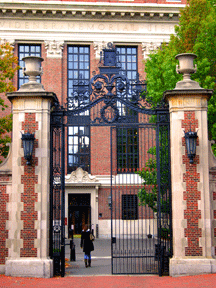By Christine LaPlaca
With the increase in technology, it has become easier for students to plagiarize. There is a debate as to whether plagiarism is truly on the rise or whether it is just more easily detected. Either way, both of these ideas are supported by the rise in internet resources. In “Is Academic Plagiarism Truly on the Rise?” from the PlagiarismToday website, Jonathan Bailey asserts that “a technological environment that makes plagiarism easier than ever, a shift in attitudes that makes plagiarism less taboo, new detection tools that make it easier to spot and a pressing desire by educators to talk about the issues” are all factors that have contributed to a greater detection of plagiarism.
Even with this apparent increase in plagiarism, it is hard to believe that Harvard students, widely considered to be some of the most talented and highly educated young adults of their generation, would resort to this and other forms of cheating. However, in August 2012 a group of Harvard students faced accusations of plagiarism. According to the New York Times article “Harvard Students in Cheating Scandal Say Collaboration Was Accepted” by Richard Perez-Pena, students were accused of collaborating with each other and with teaching fellows or assistants on a final exam in Professor Matthew Platt’s Introduction to Congress course. The article explains that these students were instructed not to consult others on the exam, but they could use outside resources such as notes, the internet, and books. Students felt this was a contradiction; since they were encouraged to share notes and study together, many of their answers would be similar anyway, so why wasn’t collaboration acceptable on the exam, as it seemed to have been in the past?
This was certainly true in the Harvard cheating case. According to Perez-Pena, students “were tripped up by a course whose tests were confusing, whose grading was inconsistent, and for which the professor and teaching assistants gave contradictory signals about what was expected.” These same students also explained that “teaching fellows varied widely in how tough they were in grading, how helpful they were, and which terms and references to sources they expected to see in answers.” With professors and administrators sending students mixed messages, how are students supposed to differentiate between what is considered “cheating” and what is considered collaboration? In addition, how are students supposed to know when collaboration is acceptable if different professors have different expectations and definitions of collaboration?
Allowing students to use the internet and instructors’ advice to collaborate are just two factors in plagiarism’s rise. Students explain that the pressure to perform well also leads them to plagiarize. Often students feel overwhelmed with homework, in addition to jobs, clubs, and extracurricular activities. With an overload of tasks to accomplish, writing that term paper becomes even more daunting. Students panic and end up waiting until the last minute, at which point they feel they have no choice but to use another’s work or fail miserably at the assignment.
According to Steve Gimbel in an opinion piece for Inside Higher Ed “Why the Great Cheat,” students have been conditioned to believe that “it is not the acquiring of knowledge, understanding, or insight, but rather the grade that is important,” with students who are ”less interested in learning than in learning outcomes.” If the education system continues to focus solely on the grade and not the acquirement of knowledge, students will continue to plagiarize just to meet the grade.
Ultimately, instructors need to define collaboration and teach their students about plagiarism rather than solely punish them for it. In “Harvard’s Cheating Scandal as a Play in Four Acts,” Howard Gardner, writing for Boston’s NPR News, explains it perfectly: Harvard and other universities should use this as a learning experience and recognize the “two most important obligations of an educational institution” are to “place teaching and learning at the center of the school” and to “create and sustain an ethical community.” Only when instructors and students realize that education is the ultimate goal will they be able to move past cheating and plagiarism in pursuit of knowledge.
Christine LaPlaca is a senior at the University of Mary Washington majoring in English and Asian Studies. The University of Mary Washington is home to the Kappa of Virginia chapter of Phi Beta Kappa.




